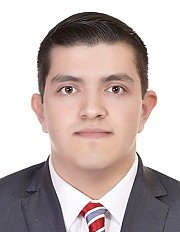
Dr. ERICK OMAR CISNEROS LÓPEZ
Resumen curricular:
Erick Omar Cisneros López es Ingeniero Químico (2012), Maestro en Ciencia de Productos Forestales (2014) y Doctor en Ciencias en Procesos Biotecnológicos (2018) por la Universidad de Guadalajara. En marzo de 2018 realizó una estancia postdoctoral en el Bioproducts Discovery and Development Centre (BDDC) de la University of Guelph, Canadá. Desde 2019 es Profesor Titular en el Física del CUCEI. El Dr. Cisneros cuenta con el reconocimiento del Sistema Nacional de Investigadores, ha publicado diversos artículos en revistas indexadas en JCR, participa en congresos nacionales e internacionales y coordina eventos de difusión científica. Ha recibido distinciones como el Premio Estatal de la Juventud en el ámbito Científico y el Premio Estatal de Innovación, Ciencia y Tecnología por parte del Gobierno del Estado de Jalisco. Sus intereses de investigación son en el área de biopolímeros, biocompositos y materiales sostenibles.
Perfil de Investigador SNII:
Perfil PRODEP:
Bases de datos bibliográficas:
Publicaciones del académico:
- Study of Mechanical Properties of Gelatin Matrix with NaTPP Crosslink Films Reinforced with Agar
- Physicochemical Characterization and Biodegradability of Nanostructured Chitosan-Based Films Reinforced with Orange Waste
- Eco-Friendly Thermoplastic Starch Nanocomposite Films Reinforced with Microfibrillated Cellulose (MFC) from Fraxinus uhdei (Wenz.) Lingelsh
- Design and Characterization of an Antimicrobial Biocomposite for Wound Dressings
- The Strategic Curriculum Redesign of Ingeniería En Ciencia De Materiales (ICMA) at Universidad De Guadalajara
- SINTESIS DE ZNAL2O4 NANOESTRUCTURADO PARA APLICACIONES DE INGENIERÍA
- EFECTO DE LA COMPATIBILIZACIÓN EN LA MORFOLOGÍA Y PROPIEDADES MECÁNICAS DE FIBRAS DE POLÍMEROS BIODEGRADABLES Y HARINA DE NOPAL
- CARACTERIZACIÓN MORFOLÓGICA DE FIBRAS POLIMÉRICAS A BASE DE PLA/PBAT Y ACEITE ESENCIAL DE PINO DEGRADADAS HIDROLÍTICAMENTE
- REDISEÑO CURRICULAR DE LICENCIATURA A INGENIERÍA EN CIENCIA DE MATERIALES EN LA UNIVERSIDAD DE GUADALAJARA
- Design and Characterization of an Antimicrobial Biocomposite for Wound Dressings
- Biodegradability Assessment of Prickly Pear Waste–Polymer Fibers under Soil Composting
- Biodegradability Assessment of Prickly Pear Waste–Polymer Fibers under Soil Composting
- Blown film stability for low, medium, and high molecular weight polylactic acid and their tensile properties
- Biodegradability assessment of prickly pear waste–polymer fibers under soil composting
- Ground tire rubber/polyamide 6 thermoplastic elastomers produced by dry blending and compression molding
- The effect of natural fillers on the marine biodegradation behaviour of poly(3-hydroxybutyrate-co-3-hydroxyvalerate) (PHBV)
- Mechanical and Physicochemical Properties of 3D-Printed Agave Fibers/Poly(lactic) Acid Biocomposites
- Mechanical and physicochemical properties of 3d-printed agave fibers/poly (Lactic) acid biocomposites
- Generation of photopolymerized microparticles based on PEGDA using microfluidic devices. part 1. initial gelation time and mechanical properties of the material
- The effect of natural fillers on the marine biodegradation behaviour of poly (3-hydroxybutyrate-co-3-hydroxyvalerate)(PHBV)
- 3d printing sustainable biocomposites from recycled pla and micro-crystalline cellulose
- Effect of rubber surface treatment on the properties of rotomolded thermoplastic elastomers
- Recycled poly(lactic acid)–based 3D printed sustainable biocomposites: a comparative study with injection molding
- Recycled poly (lactic acid)–based 3D printed sustainable biocomposites: a comparative study with injection molding
- Recycled poly (lactic acid)–based 3D printed sustainable biocomposites: a comparative study with injection molding
- Morphological and mechanical properties of bilayers wood-plastic composites and foams obtained by rotational molding
- Green Toughness Modifier from Downstream Corn Oil in Improving Poly(lactic acid) Performance
- Green toughness modifier from downstream corn oil in improving poly (lactic acid) performance
- Development of a novel and biobased modifier from bioethanol coproduct for improving the toughness of poly (lactic acid), PLA
- Effect of maleated PLA on the properties of rotomolded PLA-agave fiber biocomposites
- Aerobic biodegradation of bioplastics under different environmental conditions
- Polylactic acid–agave fiber biocomposites produced by rotational molding: A comparative study with compression molding
- Polylactic acid–agave fiber biocomposites produced by rotational molding: A comparative study with compression molding
- Surface treatment of agave fibers and its compatibilization with PLA to produce rotational molded biocomposites
- Optimization of the rotational molding processing of Agave fiber / LMDPE composite materials.
- Effect of agave fiber surface treatment on the properties of polyethylene composites produced by dry‐blending and compression molding
- Effect of fiber content and surface treatment on the mechanical properties of natural fiber composites produced by rotomolding
- Rotational molding of polylactic acid and agave fiber biocomposites
- Effect of agave fiber surface treatment on the properties of polyethylene composites produced by dry‐blending and compression molding
- Effect of agave fiber surface treatment on the properties of polyethylene composites produced by dry-blending and compression molding
- Rotomolded polyethylene-agave fiber composites: Effect of fiber surface treatment on the mechanical properties
- Rotomolded polyethylene‐agave fiber composites: Effect of fiber surface treatment on the mechanical properties
- Rotomolded polyethylene‐agave fiber composites: Effect of fiber surface treatment on the mechanical properties
- Fiber surface treatment as an approach to increase fiber content in agave-LMDPE composites produced by rotomolding


